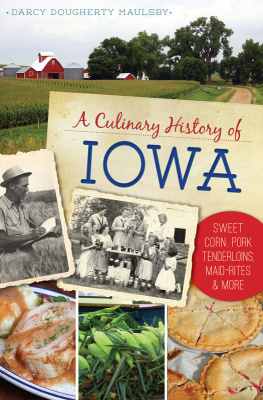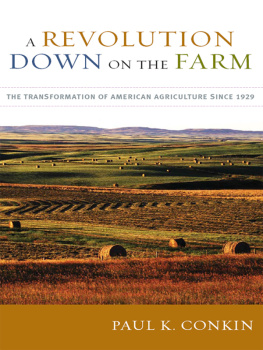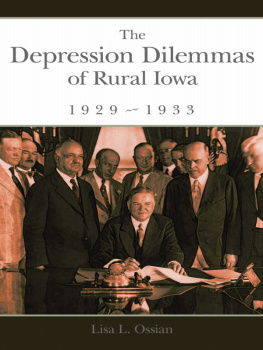2021 by University Press of Colorado
Published by University Press of Colorado
245 Century Circle, Suite 202
Louisville, Colorado 80027
All rights reserved

The University Press of Colorado is a proud member of the Association of University Presses.
The University Press of Colorado is a cooperative publishing enterprise supported, in part, by Adams State University, Colorado State University, Fort Lewis College, Metropolitan State University of Denver, Regis University, University of Alaska Fairbanks, University of Colorado, University of Denver, University of Northern Colorado, University of Wyoming, Utah State University, and Western Colorado University.
ISBN: 978-1-64642-206-7 (cloth)
ISBN: 978-1-64642-207-4 (paperback)
ISBN: 978-1-64642-208-1 (ebook)
https://doi.org/10.5876/9781646422081
Library of Congress Cataloging-in-Publication Data
Names: Durrenberger, E. Paul, 1943 author.
Title: The dawn of industrial agriculture in Iowa : anthropology, literature, and history / E. Paul Durrenberger.
Description: Louisville : University Press of Colorado, [2021] | Includes bibliographical references and index.
Identifiers: LCCN 2021029517 (print) | LCCN 2021029518 (ebook) | ISBN 9781646422067 (cloth) | ISBN 9781646422074 (paperback) | ISBN 9781646422081 (epub)
Subjects: LCSH: Corey, Paul, 19031992Correspondence. | Lechlitner, Ruth, 19011989Correspondence. | AgricultureIowaHistory. | Agricultural industriesIowaHistory. | Farm managementIowaHistory. | Land use, RuralIowaHistory.
Classification: LCC S451.I8 D87 2021 (print) | LCC S451.I8 (ebook) | DDC
338.109777dc23
LC record available at https://lccn.loc.gov/2021029517
LC ebook record available at https://lccn.loc.gov/2021029518
Some material in this book was previously published and is used with permission: E. Paul Durrenberger, Ethnography, Naturalism, and Paul Corey, Anthropology and Humanism 44, no. 1 (2019): 127143.
Cover illustration: Grant Wood (American, 18911942), Stone City, Iowa, 1930, oil on panel, Joslyn Art Museum, Omaha, Nebraska, Gift of the Art Institute of Omaha, 1930.25. 2021 Figge Art Museum, successors to the Estate of Nan Wood Graham/Licensed by VAGA at Artists Rights Society (ARS), NY.
First and foremost I thank my wife, Suzan Erem, for her support during the four years Ive been working on this book; for listening to me rant about the Depression, the thirties, the twenties, the New Deal, Paul Corey, Ruth Lechlitner, the Farm Bureau, and all of it, for listening to my musings and asking me pointed questions.
My colleague Dimitra Doukas and I have carried on a correspondence, an epistolary relationship worthy of Paul Corey and his correspondents. She helped me frame questions and offered penetrating insights. I thank my colleague Barbara Dilly, a native Iowan who knows rural Iowa from the inside out. She has taught me much about Iowa and offered me valuable comments on early drafts of the book.
I owe a great debt to David Plath, the professor at the University of Illinois who first started me thinking about questions of fiction and anthropology when I was a graduate student there.
I thank Charlotte Steinhardt of the University Press of Colorado for her patience and her faith in this unorthodox project.
Many people whose names I do not know provided essential assistance. I thank the staff of Special Collections at the University of Iowa Library where I spent untold hours reading and pondering. But especially I thank them for the use of their scanner, which allowed me to convert important materials to digital formats so I could reference them at home while I was writing. I had many occasions to appreciate the efforts of the unnamed archivists who organized the papers. The anonymous readers that the University Press of Colorado recruited provided useful comments and suggestions on earlier drafts of this book.
Questions
The history of the United States is the history of capitalism, the transfer of wealth from those who create it to those who control it. The history of its culture is a history of ways to either disguise that process or to normalize it and make it acceptable. This dynamic was established early in the Northeast and spread west as Americas robber barons incorporated the hinterlands as suppliers of raw materials. In the mid-nineteenth century, Iowa was at the western edge of that movement. The railroads and their industrial infrastructure moved Iowa to the center in a transformation from the original family farms of the settlement period into todays agricultural industry. This book is about these developments as a part of America and about two Midwesterners who chronicled them as Americans.
Paul Corey was born in western Iowa at the beginning of the twentieth century; Ruth Lechlitner was born in Indiana about the same time. Paul graduated from the University of Iowa in 1925, and Ruth received an MA in 1926. Their lives spanned the most consequential period in history of the United States, one that is difficult to imagine from the perspective of a hundred years later.
Paul and Ruth told the stories of these processes in poetry and fiction. How did these remote political and economic forces shape their lives? How did Paul and Ruth depict those forces? And finally, what are the relationships of fiction, individual lives, and anthropology?
The lives of Paul Corey and Ruth Lechlitner offer us a window into life between 1925 and 1947, one of the most radical and creative in the history of the United States, a period when everything was in the balance, when it appeared the country could as easily move toward fascism as toward communism, a period before the warfare state and the cultural and political repression that was to engulf them.
Iowas Industry
Today Iowa, the heartland of the United States, is covered by a horizontal industry that is as polluting as the old vertical ones of the Rust Belt. The oft-repeated slogan, we feed the world, is true to the extent that this industry produces the ingredients of the American diet that are responsible for our epidemic of obesity and diabetes and associated health problems. This industry also controls the political structure of the state.






 The University Press of Colorado is a proud member of the Association of University Presses.
The University Press of Colorado is a proud member of the Association of University Presses.